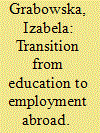| Srl | Item |
| 1 |
ID:
148398


|
|
|
|
|
| Summary/Abstract |
Examining the oil and gas industry in the Russian Arctic, this article investigates the gap between corporate social responsibility (CSR) as articulated in corporate offices and implemented at the local level. In Russia, global CSR norms interact with weak formal institutions and the strong informal expectations of state officials and local communities that companies bear responsibility for welfare and infrastructure. As a result, the concept of citizens as ‘stakeholders’ is underdeveloped. Instead, local residents remain subjects within a neo-paternalist system of governance that mimics some elements of the Soviet past. Compensation for damages to indigenous peoples has blurred legal obligations and the voluntary nature of CSR. However, the CSR in the region is constantly developing and formal methods of compensation may assist in clarifying the scope and practice of CSR.
|
|
|
|
|
|
|
|
|
|
|
|
|
|
|
|
| 2 |
ID:
148399


|
|
|
|
|
| Summary/Abstract |
This article investigates the forms of communication emerging between local administrative authorities and large-scale agricultural enterprises with regard to public service provision in two Russian villages. Using a systems theory approach and conceptualising Soviet society as an organisational society, privatisation and local government reform may be observed as attempts to disentangle former collective farms and local authorities and adjust them to the logics of functional differentiation. Empirical evidence from a former kolkhoz and an agro-holding shows that both react to the contradiction between global transformation imperatives and local expectations, using a specific combination of formality and informality as a condition of their reproduction in the villages.
|
|
|
|
|
|
|
|
|
|
|
|
|
|
|
|
| 3 |
ID:
148400


|
|
|
|
|
| Summary/Abstract |
This article studies the reaction of automotive component suppliers in Hungary to the 2008–2009 economic crisis. We find that the global suppliers viewed the crisis as an opportunity to reinforce the competitiveness of their Hungarian affiliates by engaging in product and process upgrading, and upgrading through research and development. The regional suppliers combined defensive strategies aimed at reducing costs with offensive measures in the form of product upgrading, production upgrading and expansion into new markets. The local suppliers reduced costs and reduced their workforce, but also reacted offensively by expanding into new markets, upgrading their activity and collaborating with other local suppliers.
|
|
|
|
|
|
|
|
|
|
|
|
|
|
|
|
| 4 |
ID:
148396


|
|
|
|
|
| Summary/Abstract |
This article assesses the successes and setbacks of Moscow’s policy of counterinsurgency and beyond. It challenges the general consensus in scholarship positing that military successes associated with Chechenisation have been obtained against the backdrop of Chechnya’s increasingly autonomous status within Russia, considered by some as a case of ‘systemic separatism’. The article tracks how four key mechanisms (Chechnya’s institutional design, internal opposition to the Kadyrov clan, the tradition of blood feud among kadyrovtsy—initially Chechen paramilitary forces named after both Kadyrovs, gradually transformed into seemingly regular Ministry of Interior (MVD) units—and Chechnya’s economic dependency on Moscow) have enabled Moscow to maintain control over Chechnya while simultaneously allowing its elites to consolidate power within the republic.
|
|
|
|
|
|
|
|
|
|
|
|
|
|
|
|
| 5 |
ID:
148401


|
|
|
|
|
| Summary/Abstract |
This article examines the subject of the transition from education to the labour market among young people moving directly from education in Poland to first jobs abroad. With free labour mobility in the European Union (EU), there are now more options for transitions into adulthood, including working abroad. This study uses mainly qualitative empirical material with some contextual quantitative data to examine the characteristics of young people who opted for a first job abroad, how they made their transitions from education to the foreign labour market, and the impact of their first jobs abroad on their subsequent occupational paths after returning home.
|
|
|
|
|
|
|
|
|
|
|
|
|
|
|
|
| 6 |
ID:
148397


|
|
|
|
|
| Summary/Abstract |
Although there are numerous definitions of populism, the distinction between the different forms of populism in relation to changing forms of societies has not yet been conceptualised. Such a typologisation requires a focus on changes in political paradigms relating to changing forms of societies, and on particular reactions to processes of globalisation. It is argued that adopting this approach can make research more precise both in studying a single country and for comparative cross-country research. In this article we report on development and testing of conceptualisations of pre-modern, modern national, authoritarian national and post-modern populism with reference to the case of Slovenia, a society which has recently undergone dynamic change.
|
|
|
|
|
|
|
|
|
|
|
|
|
|
|
|